Multilingualism as The Key For The Improvement of Academic Writing
EATAW 2015 Presentation Script by Özlem Alagöz-Bakan (Opens in a new window) and Marco Linguri
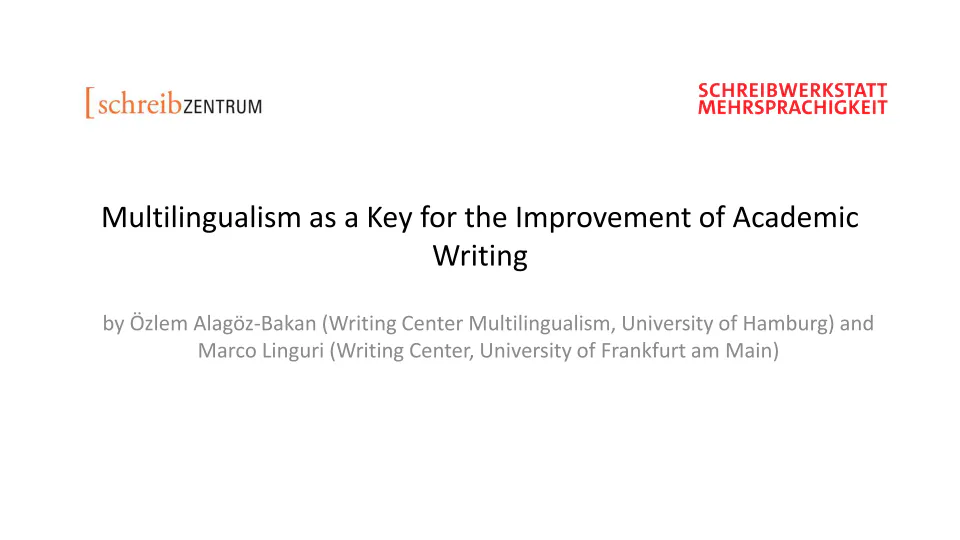
Preface
Ö: Hello my name is Özlem Alagöz-Bakan, I’m a peer tutor at the Writing Center Multilingualism in Hamburg, Germany and I’m happy that so many of you chose to come to our presentation.
M: And my name is Marco Linguri, I work and study at Frankfurt University and I would also like to welcome you to this presentation about Multilingualism as a key for the improvement of academic writing.
I’d like to start with two questions. Please just raise your hands for a yes: Who of you identifies as multilingual? And now: Who of you speaks or understands more than one language? – One of my professors asked these questions in a seminar with students who study Italian, French and Spanish, and only half of the students lifted their hands for being multilingual.
Therefore my small little personal goal today is to make you think about why there are people who think that multilingualism has nothing to do with them when, actually, they could use it as a resource – maybe as a really good resource – in their writing process but don’t do it because they don’t feel multilingual enough to do so. But let’s get started with our main topic:
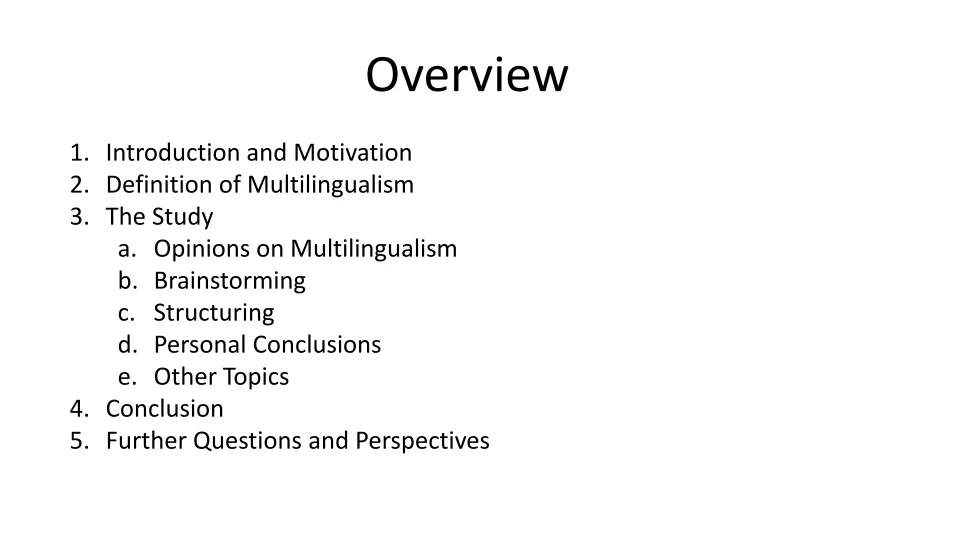
Introduction
Ö: What we are going to do today is to present you the results of a qualitative research we carried out in Frankfurt and Hamburg university – which, by the way, are two very beautifully multicultural cities where you only need to take the tube for two stations and already hear 5 different languages.
M: The motivation for us to carry out a study on multilingualism was closely related to these two universities. For example, the university in Frankfurt made a quantitative research among all of the students and found out that at least a third of them do not speak German as their first language or their only first language. Also, students who speak German as a foreign language finish their studies fifteen percent less successful compared to the other students.
Ö: In our study our goal was to hear different opinions on multilingualism, its meaning in individual writing processes and its potential as a super positive resource for oneself and one’s academic writing. We concentrated on the phases of brainstorming and planning an academic text and made our participants speak about it personally by only asking them very open questions. What we found is a lot of different opinions and strategies which we tried to group according to their similarities.
M: So, first of all we will speak about the basic definitions we used in our study, then we continue with a short description of it, the third aspect will be the results of our study, where we will first speak about the opinions of our participants on multilingualism, second their reactions to the idea of doing a multilingual brainstorm for their own purposes, third their thoughts on developing a structure while using their multilingualism, fourth what they personally took away from trying out the multilingual methods and as a last aspect we will give you an idea of the other relevant topics which came up in the discussions. Afterwards we will sum up these results and give you a perspective on further questions we would have on this topic.
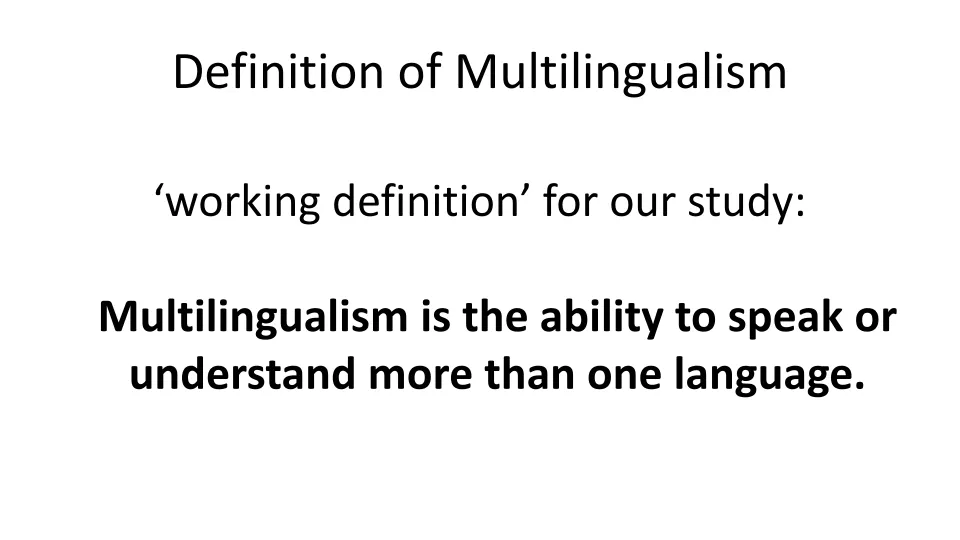
Definitions
Ö: We’ve seen that there are different ideas on multilingualism that people construct for themselves. It seems that especially the German L1-speaker studying in Germany, do often not refer to themselves as multilingual – despite of speaking at least English as a second language or even several more languages. For example one of our participants came to Marco and asked him: Am I multilingual enough for your study? – And this person speaks German, English, Spanish, French, Portuguese, Russian and a little Italian!
M: So for me as a child growing up in a multilingual household with four languages and two mother tongues, I probably have a more open definition of multilingualism – because I see it everywhere. Özlem also grew up bilingual and we didn’t need to debate on what definition of multilingualism we would like to take. During our research we were discussing various definitions of multilingualism we came across. They differed a lot from each other and we couldn’t agree on one of them. So we decided to just sit down and discuss what the two of us mean when we say multilingualism and we came up with our working definition that describes multilingualism as the ability to speak or understand more than one language.
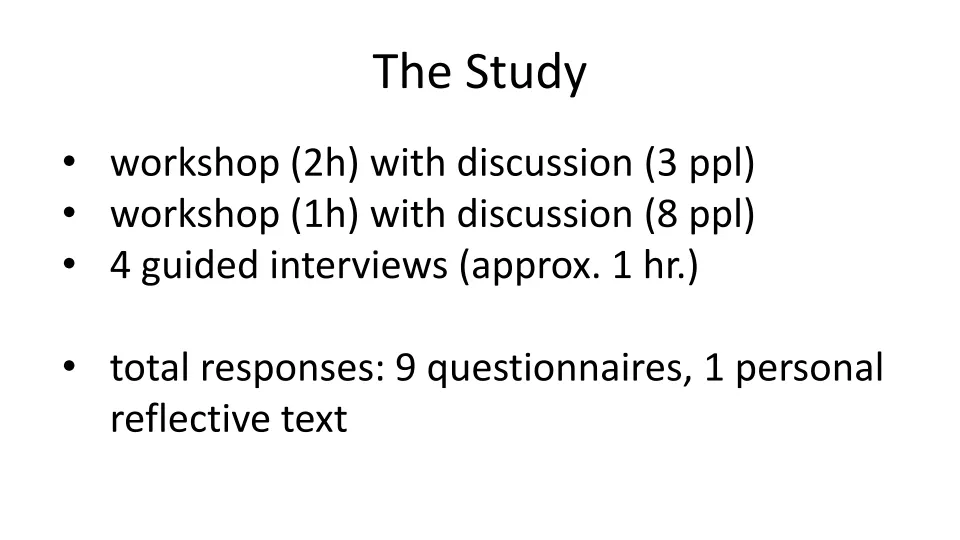
The Study
M: We collected the data via two discussions and several one-on-one interviews. Only 3 persons participated in the first discussion, so we repeated it with 8. Two persons participated in both discussions and only in the first discussion there was one person who is not working at the writing center. So we can say that the discussions were mainly among people with a reflected view on writing and a lot of writing experiences.
By the way, a lot of our tutors started discussing multilingualism afterwards in smaller groups in private - so it seems to be an interesting topic!
Ö: I conducted the interviews - in total 4 - which were one-on-one. I interviewed two multilingual writing tutors in Hamburg and Frankfurt, and two multilingual students. The focus of our research were people with academic writing background, and mostly from writing center contexts.
M: The data we were working with was approximately 7 hours of audio material, 9 questionnaires and one reflective text one of our participants sent us - obviously inspired by the discussion.
Ö: What we did with all of our participants was to let them do a cluster and a mindmap where they were allowed to use all their languages. And with about half of our participants we also did a multilingual freewriting. In the workshop and interviews we then let them discuss their impressions, feelings, opinions and hypothesis on using multilingual methods for academic writing projects.
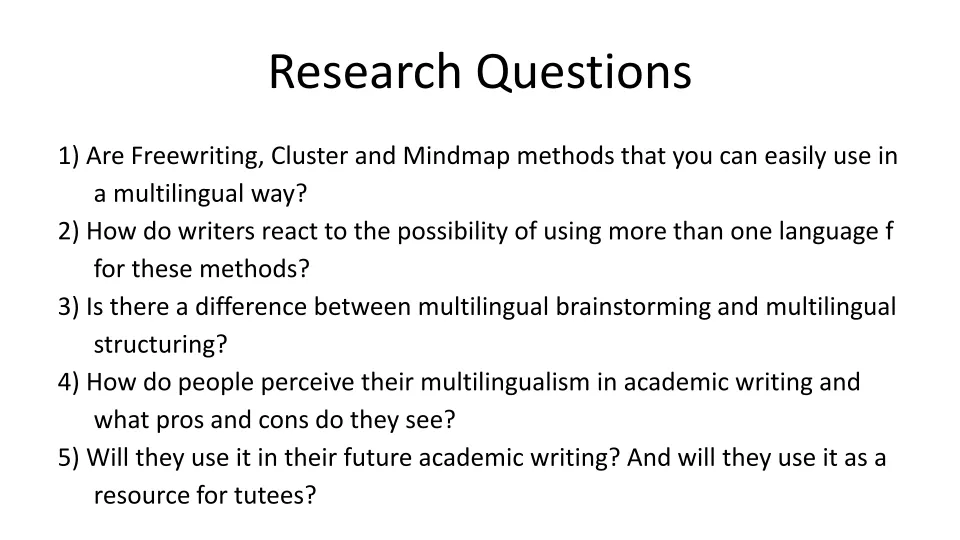
M: While carrying out our research we had five questions: So first: Are Freewriting, Cluster and Mindmap methods that you can easily use in a multilingual way? Second: 2) How do writers react towards the option of using more than one language in these methods? The third question was: Is there a difference between multilingual brainstorming and structuring? And: Do they use more or less languages in one of the cases? Four: How do people perceive their multilingualism in academic writing and which pros and cons do they see? And last but not least: Will they use it in their future academic writing? And will they use it as a resource for tutees?
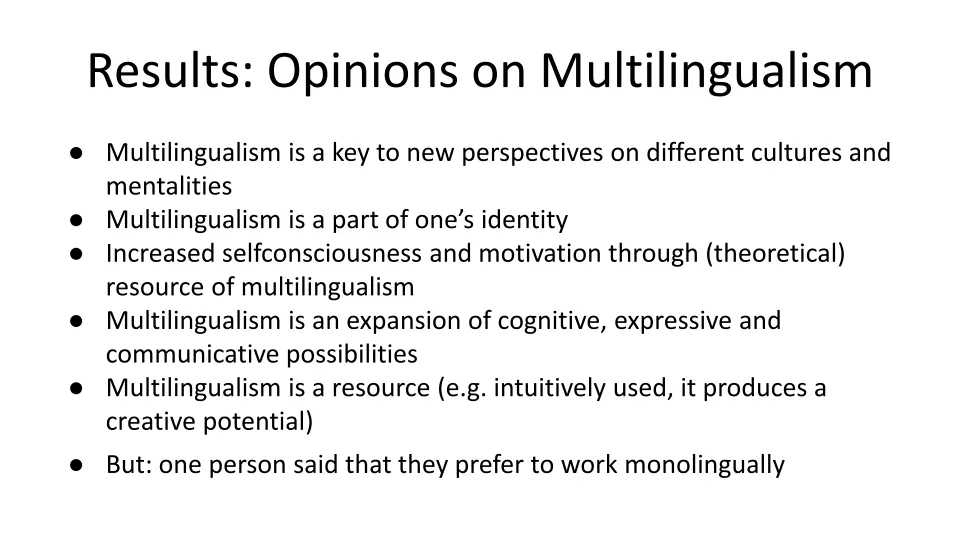
Results
Ö: We split up the results in five categories as we mentioned in the beginning. So, this is the first category. We asked our participants what multilingualism means to them. What they answered was generally positive. Starting with insights in other cultures and mentalities they even mentioned that it is part of their identity. Also, they said that the thought that they have this resource - even when they don’t actively use it - increases their self-consciousness and is a motivation to them. Furthermore they referred to it as an extra possibility in a cognitive way as well as in expressing themselves and basically for communication. And most of our participants then concluded that it is a resource to them.
But there was also one exception. One participant wrote that they would prefer to work in just one language but they also didn’t say that they couldn’t imagine it being a resource for anybody.
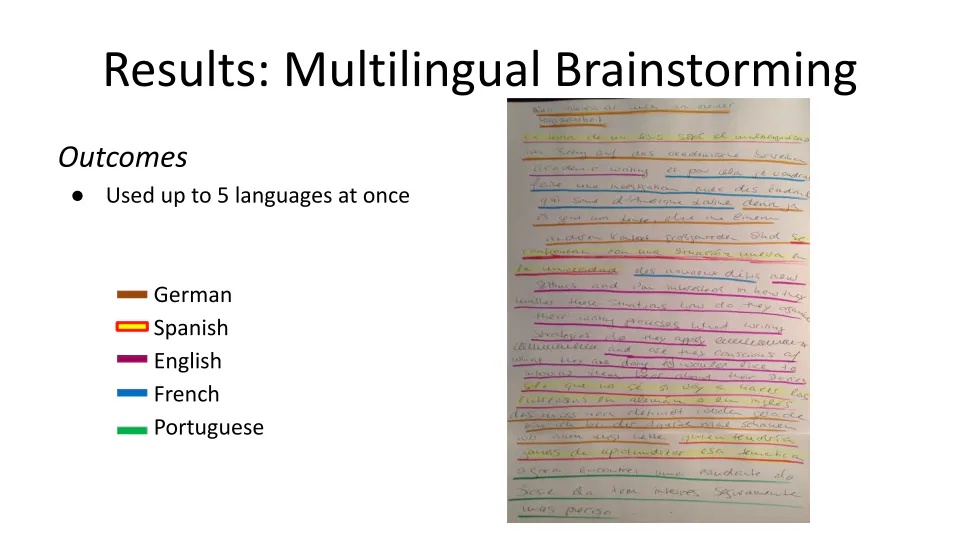
M: As we mentioned before, we introduced three multilingual methods and let our participants try them out. Some of the results have been amazingly creative and inspiring. So, of course we don’t want to hide them from you. We decided to show you these two examples. The first one is the picture you see on the right. This is a freewriting in which the writer used 5 different languages. We tried to visualize this by using five different colors. So, for example green - here - would be Portuguese or English – here – would be purple
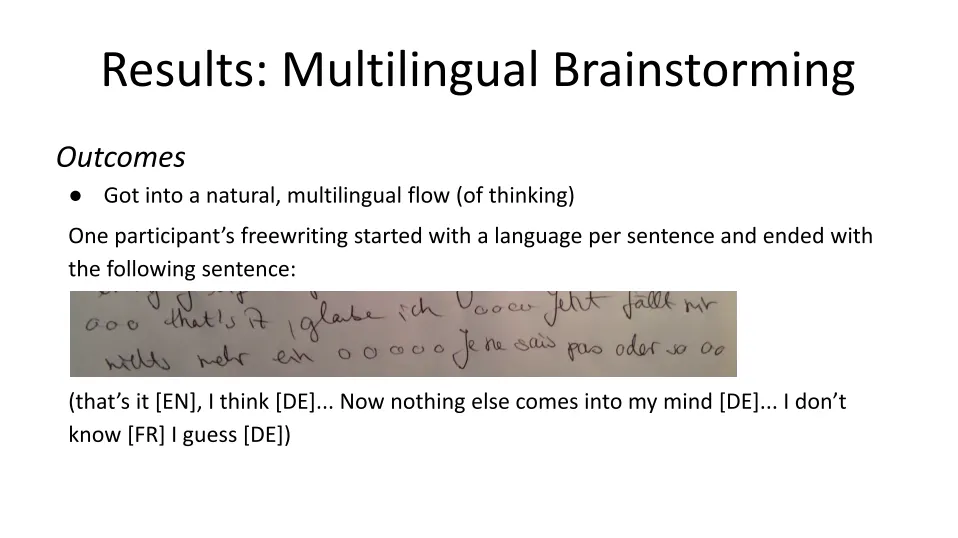
M: The other example is a sentence we extracted from another freewriting. We have here the delightful mixture of German, French and English all together, making sense together. It says: that’s it in English and then German “I think”, then “Now nothing else comes into my mind” also in German followed by ”I don’t know” in French and ending with literally “or something” which means something like “well, I guess” in German.
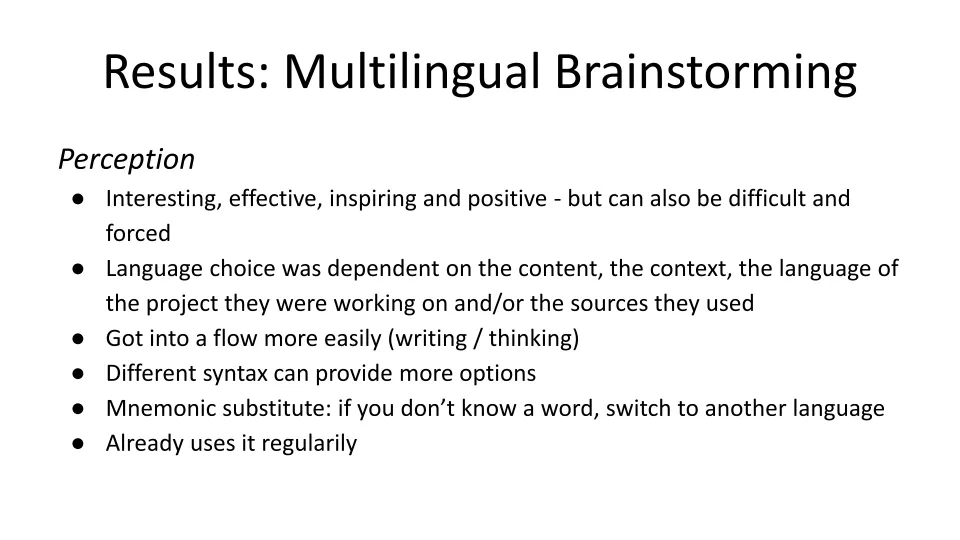
M: The next step was to ask our participants on how they perceived the multilingual brainstorming, so freewriting and clustering in any language they wanted. Again they seemed to be open to it and considered it effective, inspiring, and positive - and even if they were generally skeptical about it, they considered it an interesting experience. They also said that the content and/or the context were often the reason for using a specific language. Also the sources they use or the language which they finally have to use in the text would make them stick more to the corresponding language. Some participants observed that they actually got easier into the feeling of a flow by using different languages as they come into their minds compared to the usual way of just using one language. Also you can play around with syntax or substitute a word you don’t know with one of another language. But my favorite feedback we got was clearly that one participant already uses regularly multilingual methods.
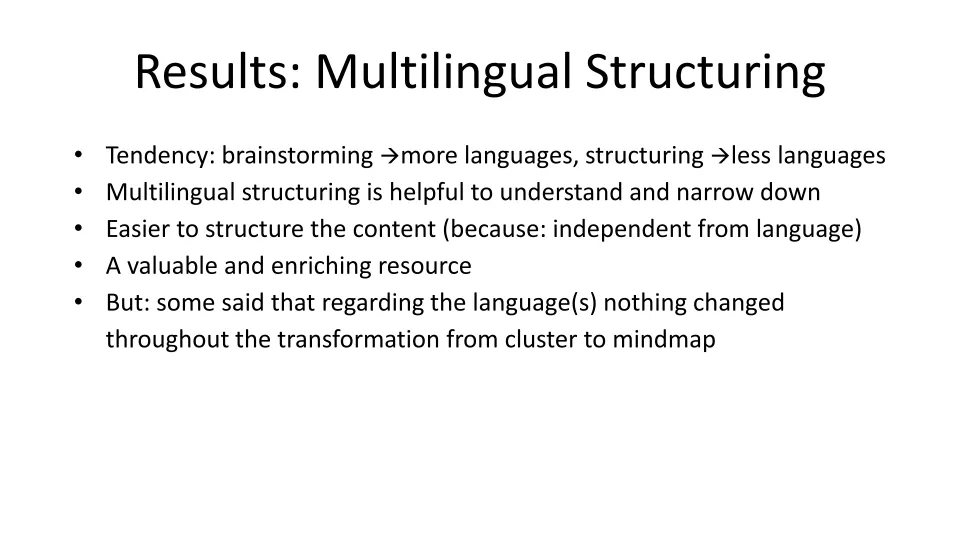
Ö: We also asked them about their impressions on the transformation from an idea generating brainstorming method like cluster to the structured mindmap - It was easy to compare because we made them do this for the same topic, so they just took their ideas from their cluster and restructured them into a mindmap.
As an overall tendency we found that the participants used more languages in the brainstorming methods and tend to write monolingual or with less languages while structuring their topics in the mindmap. Also, some of the participants considered multilingual structuring as helpful, especially to understand and narrow down the topic. Another comment on multilingual structuring argued that content and language were separated by using several languages. They described it therefore as easier and faster to structure their topics. Other participants underlined this positive perception by saying that they experienced the multilingual structuring as a valuable and enriching resource.
I’d also like to add that, again, our participants noticed that the content often determines which language will be used for which part of the mindmap.
On the other hand some of our participants said that nothing changed in the transformation process from cluster to mindmap. They used exactly as many languages in both of the methods.
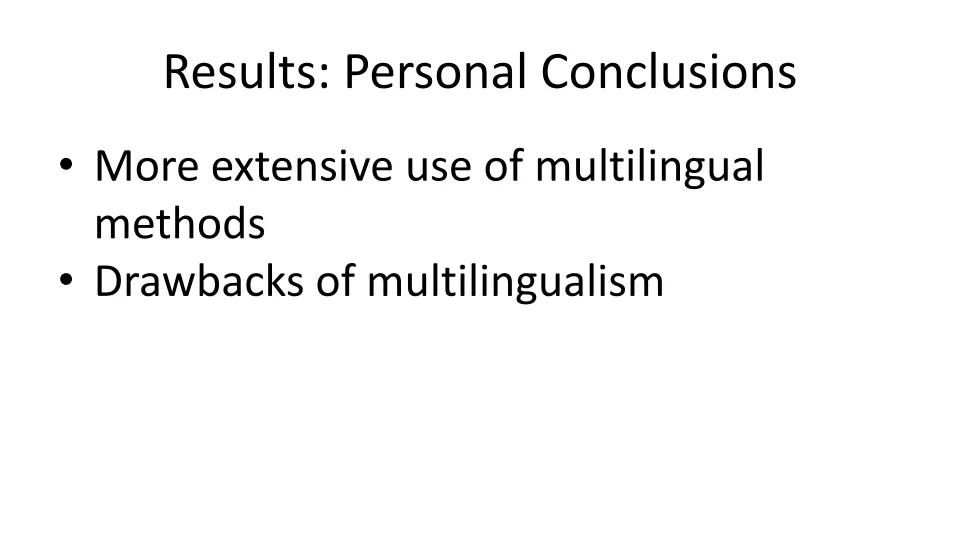
M: We wanted our participants to reflect on their use of languages and multilingualism and try to think out of societies’ monolinguistic box. In the questionnaire and in parts also in the discussions they kind of made some personal conclusions. Basically there were two kinds of conclusions. The first ones pointed in the direction of using multilingual methods more often. Some said that they now have the resolution to cherish their multilingual skills more in the future or will use multilingual brainstorming methods more often for their academic writing, for example to fight blockades when they don’t remember a word in one language. Other pointed out the use of word in one language as an anchor to remind them of a concept they couldn’t express (good enough) in the other language, for example if this word has more connotations or a more pluralistic meaning.
The second kind of conclusions pointed out drawbacks of multilingualism in writing projects. Some for example came to the conclusion that too excessively used multilingualism can be dangerous for the mother tongue and also for the actual written product which - in the end - should be monolingual. So multilingual brainstorming would be fine but structuring should be monolingual. One participant also said that they need to improve their language competences to use their multilingualism.
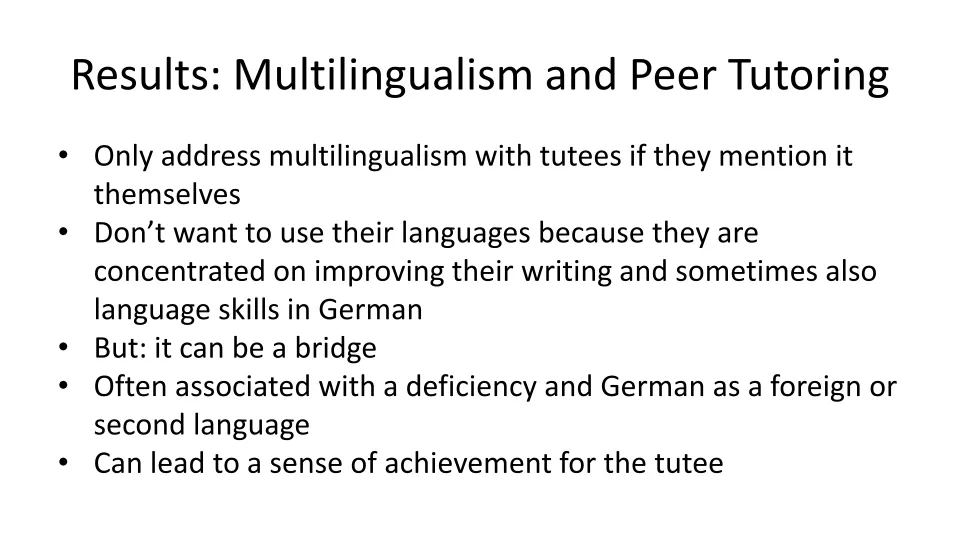
Ö: Despite of our own categories there were two topics that our participants brought up. The first one was the question of what the use of multilingualism combined with the idea that this is a possible resource means for the tutor tutee relation. First of all the participants said that they would only address multilingualism with tutees if they mention it themselves or show a potential necessity, for example with language insecurity it is possible to use multilingualism as a support or ‚bridge‘. One said: “I think it is inappropriate to address it myself… because I would bring up a topic that probably is not a topic for the tutee”.
Also, a lot of tutees don’t want to use their languages because they concentrate on improving their writing and sometimes also language skills in German but it can be a bridge to get to the final goal of writing a paper in German in an academic register.
Then, if language is a topic in the appointment it is usually connect to a deficiency and german as a foreign or second language. To address multilingualism as a resource on the other hand can lead to a sense of achievement for the tutee, for example to take away the fear of failing on a grammatical level - in this case it could help to overcome a blockade.
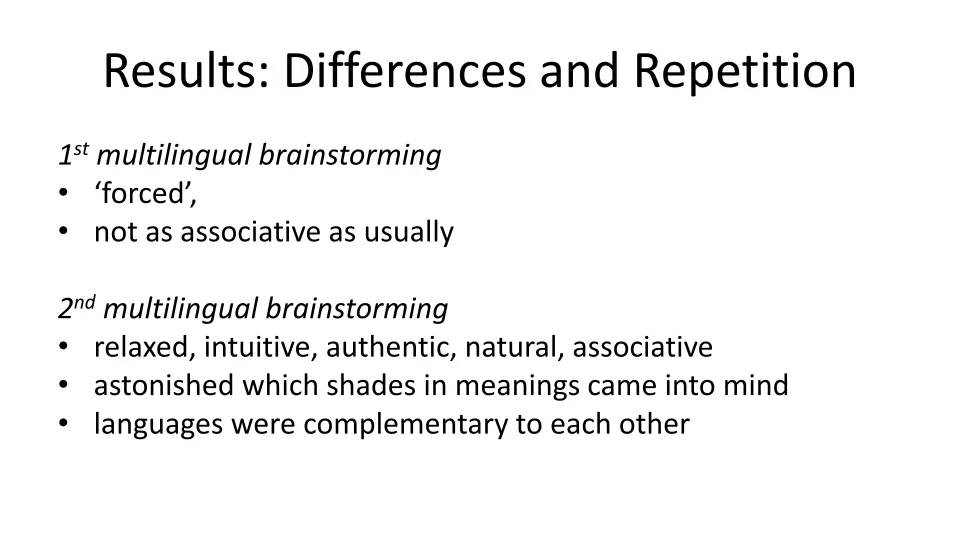
M: The other interesting topic one of our participants mentioned was how the perception of the multilingual brainstorming changed by repeating it. This participant did the workshop twice and reflected on the differences between the first time’s brainstorming and the second time. The first time was considered more ‘forced’ and therefore blocked her a little. She couldn’t get into a flow and could therefore not reach the point of associative writing.
The second time it felt more open how many languages she would like to use therefore it was more relaxed, intuitive and authentic. Like this the choice of language followed the content and became more natural.
Also, it became more associative, she said: “For example the associated Spanish word “control” was immediately followed by the germen expression “lost of control”. I thought that was really cool because it was spontaneous and I had associated that completely free”
Also she was astonished what kind of shades in meanings came into her mind: “Also the term “narratives interviews” triggered immediately the Spanish verb “narrar” that doesn’t exist in this sense in German”
The second time the languages functioned complementary to each other. She used Spanish when the German word didn’t come fast enough into her mind and vice versa.
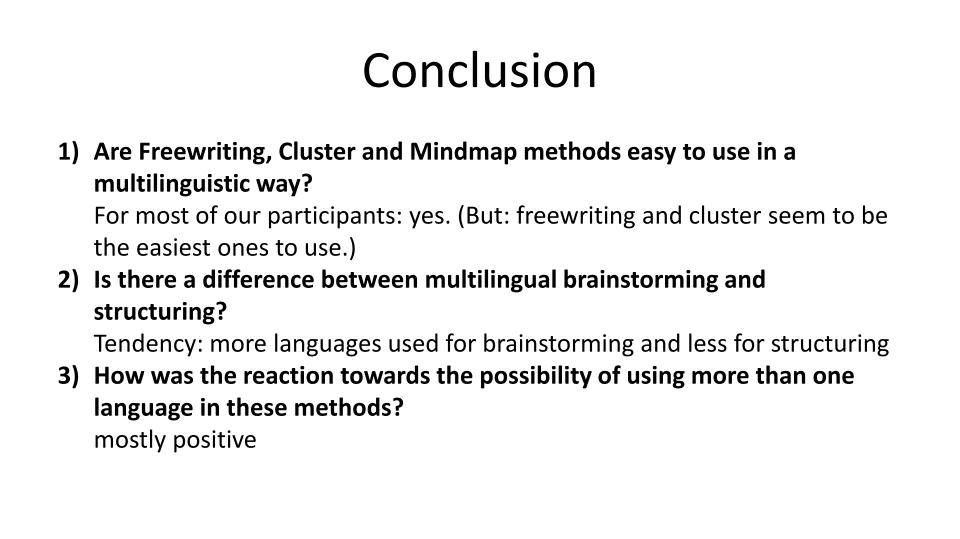
Summary
Ö: To sum up what we found out in our study we can answer our first and our second question by saying that the multilingual brainstorming was generally considered positive. The use of multilingualism in the phase of structuring on the other hand was partly considered problematic and some participants noticed that they used less languages when they transform their cluster into a mindmap. The third research question was answered in detail on slides seven and eight but we can say that it was generally a positive reaction.
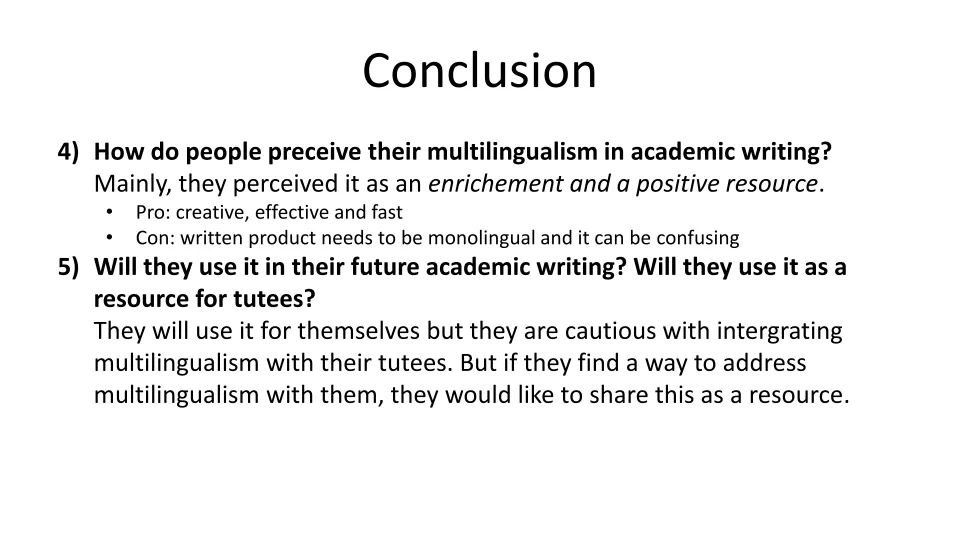
The forth and fifth question were on perception and a future perspective for themselves and their tutees. We can say that many of the participants weren’t conscious of their multilingualism but because of the workshop some of them were encouraged to use multilingual methods for their writing process, especially in the phase of brainstorming. Many participants discovered multilingualism as a resource for themselves and consider using it in writing appointments with their tutees. But they also say that it can be problematic and they have to be very cautious because it can easily turn into pointing out a deficit.
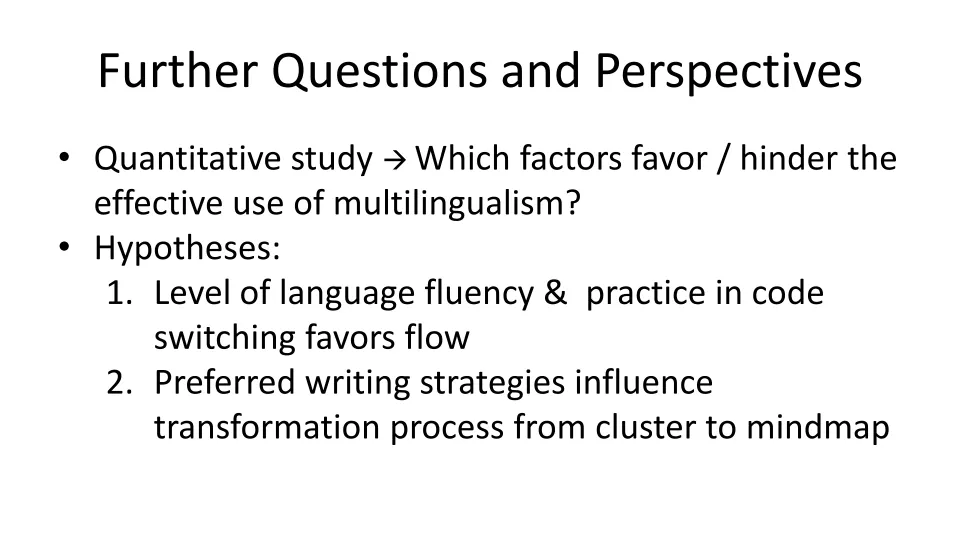
Open Questions (Ausblick)
M: As you see, we carried out a qualitative study with a small group of participants. Therefore we would suggest that further research on this topic should be done. Especially with a quantitative study on the interdependencies of the mindset of the participants towards multilingualism in relation to personal experiences - especially the negative ones with multilingualism, and the personal biography of language acquisition. Also the writer’s type, so how you prefer to proceed while writing, should be tested in such a study. With such a study it could be possible to discover significant factors that favor or hinder the effective use of multilingualism as a resource.
We do have two hypotheses based on our qualitative study but yet, based on our data we can’t argue them well enough: The first is that we got the impression that the better someone speaks a language, the easier it is to get into the flow, so if you don’t speak the language well enough it’s harder to do a freewriting and to switch languages in the text. Also it could depend on how often you usually have to switch between these languages. Our second hypothesis was that the writer’s type could influence how many languages you would still use after structuring. For example: Someone who usually writes one paragraph and immediately needs to correct it could tend to ‘correct’ the multilingual situation into a monolingual situation because they already want to use the words in their mindmap which they will later use in their paper. On the other hand, someone who usually rewrites parts of their text over and over again might be a little more indifferent towards other languages in their mindmap because they already know that they will write their text more than one time.
So sadly, we cannot verify these hypotheses but at least we can mention them to you as some ideas for the upcoming discussion.
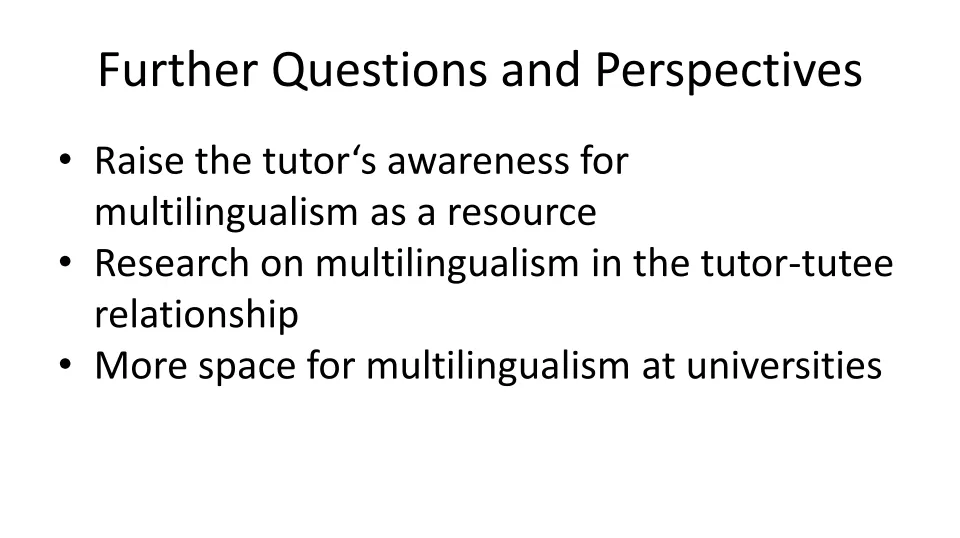
And as our last perspective we want to give: What does that mean for writing center work? First of all, if we want tutors to use multilingualism with their tutees, tutors themselves have to be aware of this resource. Probably they should first use it for their own purposes to see the advantages. Then, it would be great to speak about the issues mentioned above, so that tutors are aware of the drawbacks: For example that tutees could connect this topic to deficiencies.
Second, more research on multilingualism in the tutee-tutor relationship should be done. For example: We write protocols after every session and always ask our tutees what languages they speak. We will evaluate this data soon and it could be a great idea to connect several writing centers and carry out a study on this.
Our last bullet point here might be the most interesting but yet we don’t know a good answer to it: How can we encourage or change university’s system to provide an open space for this resource? And what needs to be changed in order to change the student’s view from multilingualism as a deficiency to multilingualism as a resource? But, yeah, this might be a good question for the following discussion.
Ö: So, thank you very much for your attention! Are there any more questions or comments?


